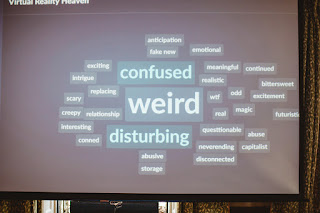Principles of Collaboration
As part of the evaluation of our secondment in 2018/19, we have developed a series of principles for future collaborations between researchers and arts organisations. Here they are - for all & sundry to access & employ!
Good luck &, if you have any questions, please feel free to get in touch.
- Prioritising the understanding of partner’s structural and cultural working practices
Taking time to gain an understanding of each partnering organisations’ working practices is requisite to the success of such collaborations. Each organisation may perceive their partner to operate in a unique or unfamiliar way - a potential source of frustration and misunderstanding. Hence, we deem it vital that time is taken to understand partnering organisation’s structure; as well as their logical, procedural, and ethical rules before any research is undertaken together.
- Partnering projects should develop a shared model for ethics
What is deemed ethical within one organisation, may be ethically ambiguous (or worse unethical) within the other. From experience, this can be a deeply frustrating aspect of collaboration between university and industry. Ethics is imbued within the research process of universities and in this way it is preventative but, in industry, ethics can often be something which is reactive. Consequently, industry professionals can fail to appreciate the level of scrutiny involved in reviewing ethical procedures, the amount of time necessitated in ratifying these plans, and the importance of rigid adherence to outlined ethical procedures. A working ethics application should be one of the earliest project milestones.
- The team should progress from being multidisciplinary to interdisciplinary
Research projects of this kind may begin as a multidisciplinary endeavour, with experts from different fields approaching a shared problem from different lenses. Yet we have found great value in both allowing individual team members to lead in the areas where they have a great deal of prior experience and migrate their involvement towards other areas in which they have less familiarity. In this way, collaborations such as these entail the simultaneous teaching and learning of new skills. In successful cases, with time, these teams become more interdisciplinary than multidisciplinary - the true marker of knowledge exchange. Moreover, this transition is fundamental in order to foster innovation - the consideration of phenomena from new perspectives or by using new tools to study them.
- Close proximity between team members should be maintained
Depending on the schedule of events involved within the collaboration, regular and in-situ meetings are advisable, particularly at the beginning of the project. In our case, we maintained bi-weekly meetings at the beginning of the project, which increased to a weekly meeting in the build-up to planned events. In our case, these meetings were conducted within the environment of the university partner, due to time constraints. However, we would advocate for ensuring future collaborations allow for meetings to take place on a by-turn basis to enable contextual familiarity for all project partners.
- Stakeholder objectives must be transparent
Project partners should be united in actioning a shared vision for the collaboration. An approach by which individual (or groups of) team members wish to subtly attend to their own agenda is not advisable and may lead to tension between different factions of the team. Instead, all team member objectives should be outlined and modelled at the beginning of the project, as well as the steps required to achieve them.
- Encouraging the empowerment of participants is important
The role of project participants must also be considered early on in the process. It is vital to instil the notion in all team members that participants in the project should benefit from their involvement in a meaningful way. Participants are not simply a source of ideas and inspiration and they should be empowered with knowledge about the project, as well as be given a voice in the process.
1. Early planning of engagement activities is essential for public engagement Identifying and early engagement with potential participants and venues, as well as allowing additional time to account for the timeframes and resources of potential stakeholders is essential. Particularly when working with schools, organising a single day event, let alone several days, can be a significant challenge. In such cases, events may have to be organised months in advance and may not be possible at all without having first garnered high-level contacts within the host organisation. Hence, we recommend that efforts to cultivate these contacts should be undertaken as part of the funding application process.

Comments
Post a Comment